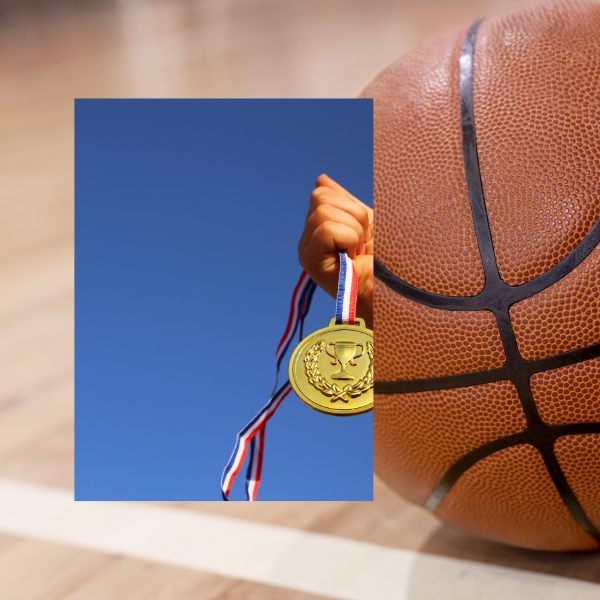For athletes, being an Olympian is an honor. All of the preparation, goals, sacrifices, and stretching are fulfilled while on that global stage. The audience is cheering you on. Your family gathers to watch you compete. You may even become a meme.
While folks are already looking ahead to the 2028 Olympics, I’m still thinking about this year’s Olympians, and the discourse around their age. I mean sure, commenting on an athlete’s age is a tale as old as time, pun intended. Sports can take an incredible toll on the mind and body, whether you play professionally or not. But I can’t get over the way our culture ages professional athletes. For most people, your 40s are a time to continue to discover your power and form a life you can continue to desire. For athletes, your 40s mean the Crypt Keeper is ready for you to take your last shot.
Just look at Australian basketball player Lauren Jackson, the oldest player at the Paris Olympics at 43 years old. She’s shared on her Instagram that she actually came out of retirement to play in this year’s Olympics, her fifth Olympics. And she’s not the only one to be considered an old-timer this year.
Dynamic Diana’s Last Dance at the Olympics
Diana Taurasi has played basketball for Phoenix Mercury since she was drafted into the WNBA in 2004. She poignantly spoke about the 2024 Olympics—her sixth time at the Olympics, giving her the most Olympics appearances in women’s basketball history—being her last one. Photo carousels on Instagram during the games showed Taurasi at each of her Olympics, and there was a lot of noise that basically amounted to: Why don’t you just retire? In response, Taurasi called out ageism in sports, and affirmed that she was there to compete.
As women’s sports continues to grow, particularly in the WNBA, Diana Taurasi is an absolute foundation of that growth. Deviating from the noise, seeing Taurasi still playing the game at her level should only show what can be achieved.
Will LeBron James be strong enough to blow out his candles?
If I had a dollar for every time a commentator mentioned that LeBron James is 40 years old, I could buy an NFL team. It’s worth noting that LeBron is actually still 39, and does not turn 40 until the end of the year.
LeBron has been in the spotlight for most of his life as a phenom high school basketball player. Earlier this year, he became the highest scoring basketball player of all time. I wonder if there is an incentive for commentators to mention his age. Was this his last Olympics? When will he retire? Meanwhile, at the exhibition games leading up to the Olympics, he showed a dominance that made him look like he could play for another twenty years. His physicality is remarkable and that is what makes the discourse around his age an antithesis to his athleticism.
The Brady Bye
Tom Brady played football into his 40s, retiring just a couple of years ago. There was a lot of back and forth, will-he/won’t-he, surrounding his retirement. When he played for the New England Patriots, there were multiple seasons where he apparently didn’t meet the public’s expectations. Then he won a Super Bowl his first season with a new team. This was followed by further discourse on unmet expectations, mostly from commentators who had never played sports, or from social media users hiding behind anonymous accounts.
Because Brady had played for decades, even as a kid, moving away from the sport that had given him so much—and that he gave so much to in return—was not taken lightly. When Brady retired, it was a decision that marked the end of one incredible career, and the beginning of another one as a commentator who has actually played the sport.
Age Is a Mindset
All in all, spectators should view athletes with awe, whatever their age, whenever they retire from athletic life.
We’ve all seen the stories about people running marathons in their 70s. People wonder: What does this person eat? How can they do that? Aren’t old people supposed to be on rocking chairs? Meanwhile, these runners (and other athletes) continue to defy the odds, and all of our expectations.
At the same time, many athletes retire at a young age. They achieve their dreams of being a professional athlete, win a championship in their sport, and then decide they want to maintain their body and try something new. Still, they leave an incredible legacy behind. One example of this is Serena Williams’ evolution away from tennis, as she phrased it in Vogue. She had a desire to expand her family and continue Serena Ventures, so she stopped playing tennis. She’d always known she wouldn’t play it forever. Yet the memory of her tenacity will reverberate throughout sports for generations to come.
Shifting our perspectives around body, age, and rest will only help society progress. It will allow us to tune out the noise that comes with ageism. It will help us stick our landings, remaining true to our own voices. As I have mentioned before when writing about mental health in sports, an athlete’s age should only fuel their power and wonder. No matter the court or field, we can exceed what we think is possible.


